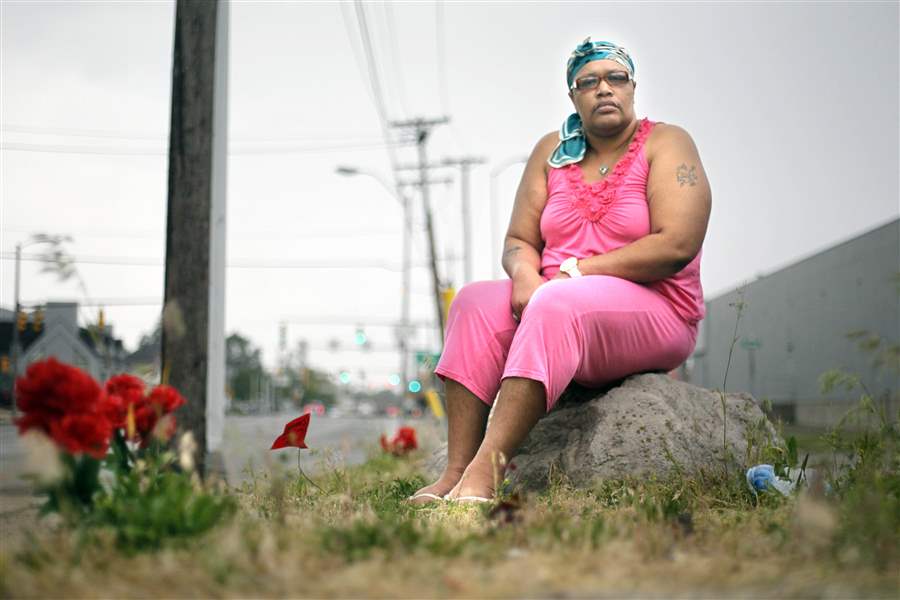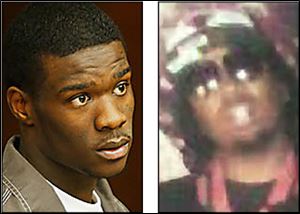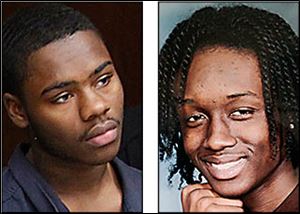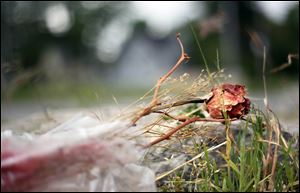
BATTLE LINES: GANGS OF TOLEDO
For city’s gangs, songs a deadly battle cry
Lyrics name names, vow killings of rivals; and then, deliver
5/26/2013
Jackie Chandler believes gang violence will grow. She sits near flowers for La’Quan Dunbar, who was best friends with her nephew. Both men were shot to death.
THE BLADE/AMY E. VOIGT
Buy This Image

Jackie Chandler believes gang violence will grow. She sits near flowers for La’Quan Dunbar, who was best friends with her nephew. Both men were shot to death.
He never saw it coming.
By the time paramedics arrived, La’Quan Dunbar was dead.
A single gunshot wound in the back of the head.
Another casualty of the streets.
Another young black man dead, allegedly at the hands of another young black man.
And for what?
Police and gang sources said it was about a song. A 3-minute, 32-second gang song that Mr. Dunbar had nothing to do with.
Wooty woo la la la.
“I’ont understand how ah [expletive] ah kill somebody over ah song but they ah let ah [expletive] owe them some money!!!” one man posted on Twitter less than two hours after Mr. Dunbar was killed.
The song, uploaded nearly two months ago to SoundCloud.com, a Web site that allows artists to post and share original music, has more than 35,000 plays and more than 220 comments.
The song’s title, “Wooty Woo La La La,” has become a slogan, if not an anthem, for Bloods-affiliated gangs in Toledo.
Young people aren’t shy about posting it on Twitter, blasting the song — with a beat ripped from national rap artists Young Jeezy and 2 Chainz — driving about town; there are children who know all of the lyrics, which brag about killing rival gang members.
“Wooty woo la la la we den killed a crab, shout out to the Bloods that don’t give a damn.”
“Crab,” in gangland, is considered a disrespectful term for Crips; “slobs” and “donuts” are the equivalents for Bloods and Folks respectively.
“Diss songs used to not be any big deal, but now they are a big deal because you have people getting killed over these songs,” said Matthew Donahue, a lecturer in the department of popular culture at Bowling Green State University.
Dead at 20 because of a song.

Quincy Allen, left, 21, a member of a Folks gang, is charged with the murder of LaQuan Dunbar.
A feud
The official statement from Toledo police is that on April 19, Mr. Dunbar and another man were outside Gas & Express Mart, 2315 N. Detroit Ave. The dispute escalated and, at 1:28 a.m., a 911 caller reported that a person had been shot.
Police declined to comment further.
This feud appears to have started — long before Mr. Dunbar and the shooter met that night — in an ongoing exchange of underground, but totally public, gangster battle raps.
“The summer is going to be crazy with all the deaths,” Jackie Chandler said. “They won’t leave it alone. It’s just going back and forth.”
Ms. Chandler knew Mr. Dunbar through her nephew Ramon Dorsey. The two were best friends.
On May 12, Mr. Dorsey was found slumped behind the wheel of a black sport-utility vehicle, parked in a North Toledo alley, shot in the head. He later died at Mercy St. Vincent Medical Center.
In the days after Mr. Dunbar was shot, and before any suspect was named, gang sources said the lyrics in “Wooty Woo La La La” went too far; they were the reason Mr. Dunbar was killed.
The lyrics knock three men, with some affiliation to Folks or Crips gangs, who all died within the past two years.
“[Expletive] all the crabs that’s dead. And it's [expletive] Tae, [expletive] Pooh. You listening? [Expletive] you.”
Comments posted on the song range from support to anger for disparaging the dead.
“[Expletive] yall on folk yall gonna get it on folk u said [expletive] pooh and tae [expletive] yall,” wrote one commenter.
Days after Mr. Dunbar was killed, this comment was posted: “on folkz yall … lame thats why we killed yall [friend] #600 till the world blow.”
Charged with murder for Mr. Dunbar’s death is 21-year-old Quincy Allen.
Allen, is, police said, a member of a Folks gang. His younger brother, Deonta Allen, was allegedly shot and killed in October by Traquawn Gibson, a member of the Manor Boyz, Bloods. He is charged with murder and goes on trial June 10.
Deonta Allen’s nickname was “Tae.” He’s one of the young men dissed in “Wooty Woo.”
“It’s like a battle,” said Aliyah Jackson, 15, a friend of Mr. Dunbar.
Family of the Allen brothers could not be reached for comment. The mothers of Mr. Dunbar and “Pooh” — whose real name is Deadrick Rocker — declined to comment.
The Rocker youth, 17, was shot dead at Tecumseh and Hoag streets on Dec. 30, 2011. Another teen, Shakur Shabaa, then 16, was wounded in the shooting. In April, Davion Wilson, 17, was sentenced to 15 years in prison for involuntary manslaughter and felonious assault with a gun specification for his role in the shooting.
Also dissed in “Wooty Woo” is “J Rocc,” Jamar Justice, a member of the Geer Gang Crips, who died of an accidental overdose on April 7, 2011.
“I mean, let’s be honest. With these songs being made, there is not a positive thing that can come from it,” said Charlie Mack, the program director at 107.3 FM “The Juice,” a local hip-hop and R&B radio station. “When I make a song about somebody I don’t like, they’re going to do something about it, and the circle continues and keeps creating more and more tension.”

Deonta Allen, left, was allegedly shot and killed in October by Traquawn Gibson, a member of the Manor Boyz, Bloods.
Nothing new
Battle raps and diss songs are nothing new.
They started decades ago with disc jockeys who battled one another to draw in more listeners than others, Mr. Donahue said. The base expanded to include other people involved in the hip-hop culture — graffiti artists, break dancers, and eventually rap artists.
When artists started to inflate themselves and diss others can’t be pinpointed, Mr. Donahue said.
The culture seemed to expand in the early 1990s after N.W.A. split up and two of its national artists, Eazy-E and Dr. Dre, began to feud.
It was once a battle of who was the better lyricist, but eventually morphed into violence. The earliest, most publicized feud that led to actual gunplay were the deaths of Tupac Shakur, or 2Pac, and Christopher Wallace, or Notorious B.I.G. or Biggie Smalls. The men were shot to death in separate incidents in 1996 and 1997, respectively.
“You can get somebody like a 2Pac or Biggie Smalls … who are casualties of their own lyrics,” Mr. Donahue said. “They would often diss other artists … and often with a sense of violent undertones, and they become casualties of their own songs. The irony of that is unbelievable.”
Like most things on a national stage, battling became localized.
Before listening to “Wooty Woo La La La,” Mr. Mack said he thought, “It can’t be all that bad. It can’t be just a complete diss song. And when I listened, let’s be honest, these people are serious. This is not a joke to them. They really have strong feelings for other people and they are not afraid to say it in the least.”

A dried red rose is one of many flowers spread along a patch of grass in front of the gas station near Detroit Avenue and Monroe Street where La’Quan Dunbar was murdered.
Violent words
The gangs don’t seem to be afraid to say it publicly.
Though it certainly wasn’t the first local diss song, seven months ago, “[Expletive] Young Money” was uploaded to SoundCloud.
The song, by members of the Geer Gang Crips and a subset Slime Time, has more than 33,000 plays and taunts members of various Bloods gangs.
Lyrics like, “I said [expletive] the whole Moody, I ain’t got no manners,” and “Tell your boy Monster I’ll take his cookies,” are blatant digs on the Manor Boyz and an individual member whose street name is “Monster.”
At least twice, the song takes shots at “Traquawn” — who sources said is Mr. Gibson, the Manor Boy.
“Traquawn, stop trying to be something you not, boy. Burner up, pop, then you really be a hot boy.”
The lyrics basically insinuate that Mr. Gibson was all talk, no action.
Before the song was released, Mr. Gibson had a bad reputation, but most of his offenses were misdemeanors — disorderly conduct and criminal trespassing.
In October, Mr. Gibson was accused of going into Scott High School, where he was not a student, and, with others, assaulting a teen who was in class.
Eight days later, police say he shot and killed Deonta Allen; Limmie Reynolds III, 20, was also wounded. Police declined to comment about whether the song and the shootings were related.
Mr. Gibson is scheduled for a June 10 trial where he will face two murder charges — one for the death of Deonta Allen and the other for the shooting death of his estranged girlfriend, CreJonnia Bell.
Ms. Bell, 19, was shot in her chest, abdomen, and head multiple times on Nov. 18.
An ongoing battleThe online battle raps continued.
Two months ago, “C.R.I.P.” — apparently the song that led to “Wooty Woo La La La” — was posted to SoundCloud. It has more than 40,000 plays.
The song, again by members of the Geer Gang Crips, contains lyrics about killing Bloods.
“Load up the straps, it’s time for a murder scene. Some BK [stuff] I ain’t talkin’ ’bout Burger King.”
“BK” stands for Bloods killer; it’s why some Crips gangs spell subset names with ‘cc’ instead of ‘ck.’ A ‘cc’ is Crips friendly; Bloods use ‘ck’ to mean Crips killer.
Mr. Mack, who works with the Toledo Community Initiative to Reduce Violence, reaching out to gang members asking them to stop the violence, said for every negative role model, the city needs two who are positive.
“We can’t give up,” he said.
And at the same time, gangs, or anyone, making diss songs can’t be stopped, he said. They deserve to create music, although he said some of the local artists might have a shot at making it if they used their talents for something positive.
“We’re trying to put the genie back in the bottle and figuring out how to stop it, but it’s ahead of where we are. They’re so far gone. We have to catch up before we can stop it.”
Contact Taylor Dungjen at tdungjen@theblade.com, or 419-724-6054, or on Twitter @taylordungjen.